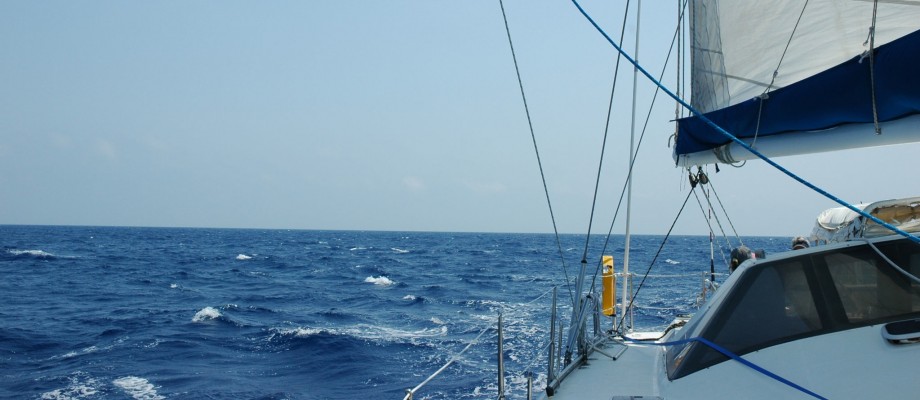May 16 – 21, 2013
We attended a cruisers’ potluck lunch at the edge of the main soccer field. This was another chance to meet more of the group that had just crossed the Pacific, as well as celebrate Nikolai’s (s/v Voyageur) 15th birthday. There was another game of soccer between the cruising kids, the cruising young-at-heart adults, and a few locals. Rain began to fall, but the soccer game continued. There was no shortage of wet and muddy clothes!
That night, there was another torrential downpour, so we were optimistic about our hike to a nearby waterfall the next day. With all the rain, the waterfall, that was reported to have only been a trickle the day before, was now a beautiful stream of flowing water, and the pool below was clean and fresh. The kids swam and jumped from the rocks above.
Yes, chicken hunting! In the Marquesas, anything outside village limits is considered up for grabs. That means anyone can pick fruit from any tree, or hunt any animal, outside the village. In fact, there used to be about 20 horses that were used for giving tours on the island. However, grazing areas within the village were scarce, so in order to keep them fed, the horses were moved to the grassier highlands. Unfortunately, the horses ended up as meals for some hungry locals. I think I’m happy to report that with our noisy group of kids, the chickens faired a lot better than the horses.
As for our craft hunting, the afternoon turned into a wonderful Marquesan experience. Since Nathalie (s/v Sueño) is not only French Canadian, but also marvelous at public relations, we ended up for an extended visit within one family’s home. We started out by looking at their handmade wood carvings (tikis, war clubs, bowls, and ukuleles). Over the course of the afternoon, we were offered different foods to try; local seed grapes, local apples, bananas, and dried tuna. We learned about their way of life and politics, all in conversational French. Over 20 years ago, I had taken 6 years of French classes, but because it was so long ago, the cobwebs had to be dusted from my memory. I found I was able to understand the gist of most conversations, but my speaking was in dire need of help.
On the Sunday, we were invited to the local church for lunch (~$7 USD per person). We were seated in the churchyard at tables under a large mango tree. Women served each of us a plate of goat with rice, plantains, bananas, and breadfruit. All the food was cooked over an open fire, so it all had a wonderful smoked flavor to it. I have since tried to duplicate the breadfruit recipe on the stovetop, but the delicious smoky flavor is missing.
That evening, we returned to the church for a Polynesian performance of dances and skits. All of the spectators were seated in a large circle around the churchyard. The cruisers were placed together on one side of the circle.
We enjoyed all of the performances. They were extremely creative and funny. The most special was one skit dedicated to all of the English-speaking countries. Prior to the performance, some of us loaned the local dancers several courtesy flags of our countries. So they could perform the skit in English, they also received some quick coaching of the English language. When it was time, the dancers came out wearing the flags hanging from their headwear. The dancers and musicians also sang “You Are My Sunshine” in English, and the cruisers happily sang along with them. My favorite song was the Marquesan version of the “The Lion Sleeps Tonight”.
When arriving in the Marquesas Islands, boats are supposed to clear into French Polynesia at either the islands ofHiva Oaor Nuku Hiva. However, since most boats are coming from Central andSouth America, Fatu Hiva is geographically and most desirably the first island. To go the other islands means missing Fatu Hiva because boats have to beat back against the trade winds. However, the French Polynesian government has become tolerable to boats arriving in Fatu Hiva first. As long as cruisers are honest of their whereabouts, then it’s acceptable to the officials for boats to go to Fatu Hiva for a few days before moving over toHiva Oaor Nuku Hiva to clear into the country.
With all that said, when cruisers arrive in Fatu Hiva, they arrive without any French Polynesian money. There are no banks on Fatu Hiva, and only French Polynesian Francs are accepted. However, the people on Fatu Hiva will gladly trade for goods. They are happy to give food and services in exchange for rum, soaps, body oils, make-up, hair products, clothes, shoes, and toys, as well as fishing gear and lines for their boats. We traded some soap, body oil, toothpaste, chapstick, and toys for a huge bag full of mangos, local apples, lemons, and pamplemouse (grapefruit).
We will never forget the island of Fatu Hiva. Our first landfall at the end of our Pacific crossing, and an absolutely gorgeous island with extremely friendly people.












